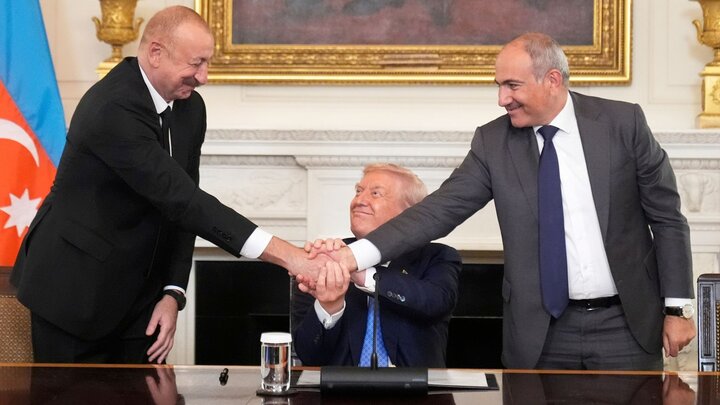Two Major Obstacles Hamper Pashinyan-Aliyev Peace Deal; Russia’s Position Weakens

According to the English section of webangah News Agency, citing Mehr News Agency, the Economist published an analytical report referring to the trilateral meeting between U.S. President Donald Trump, Armenian Prime Minister Nikol Pashinyan, and Azerbaijani President Ilham Aliyev at the White House. The report highlights the “peace agreement” signed by Baku and Yerevan leaders to end their long-standing conflict. It argues that this accord undermines Russia’s influence in the South Caucasus while examining the obstacles and challenges to implementing peace between armenia and Azerbaijan.
The full report follows:
The South Caucasus is a mosaic of warring rivals with closed borders. Watchtowers and bunkers dot its frontier lines. On August 8, Donald Trump met with Nikol Pashinyan and Ilham Aliyev to end conflict between their nations. At the White House, they signed a “peace declaration” alongside agreements on trade and security. Crucially, Armenia agreed to create a U.S.-administered transport corridor across its territory connecting Azerbaijan with Nakhchivan-its geographically separated exclave. This corridor will be named TRIPP: Trump’s Route for International Peace and Prosperity. Trump called it “a great honor.”
Aliyev and Pashinyan pledged to nominate Trump for the Nobel Peace Prize. The deal weakens Russia-a long-time player in this dispute-and Iran as well. Although not a formal peace treaty yet, it lays groundwork toward an even larger achievement: resolving one of the world’s most entrenched conflicts while promoting regional détente-including normalizing ties between Armenia and Turkey, Baku’s ally. success would test both American diplomacy and Armenian-Azerbaijani willingness; however, Russia could still pose difficulties.
Background of Baku-Yerevan Conflict / Moscow Punishes Pashinyan
Armenia and Azerbaijan have been at war for over 35 years. In the late 1980s as the Soviet Union collapsed,Armenian-backed separatists seized Nagorno-Karabakh-a region within Azerbaijan-and later established a buffer zone around it. For years this conflict remained frozen but unresolved. With booming oil gas revenues fueling military buildup equipped with Turkish drones and israeli missiles, Azerbaijan regained surrounding territories in 2020 before retaking Nagorno-Karabakh itself in 2023-forcing about 100,000 Armenians from their homes into exile.
Russia had supported Armenia during the 1990s but stayed silent during recent fighting-as partly punishment for Pashinyan who rose via peaceful revolution in 2018 displacing Kremlin-friendly elites.
The Two Main Obstacles To Agreement
Since early 2024 both sides moved cautiously toward peace talks conducted directly rather than through mediators like Russia or Turkey or OSCE Minsk Group-the multilateral body founded decades earlier addressing this dispute-which led them by March to agree on draft provisions.
Two barriers remain: first is Azerbaijan’s insistence that Armenia remove all references to Nagorno-Karabakh from its constitution-a move requiring referendum approval; second is demand for a transport corridor access through Armenian territory linking Nakhchivan.
azerbaijan proposed reopening this route under Russian supervision per their ceasefire terms negotiated in 2020; however both parties later rejected Russian control but failed yet to find an alternative management arrangement.
U.S.-Proposed Solution: Leasing Corridor To Washington For 99 Years / Angering Russia
Under these circumstances Trump offered a partial fix after months of shuttle diplomacy by American negotiators traveling between Washington DC region.
Armenia will lease (Zangezur) corridor land for 99 years to America which will employ contractors managing transit operations.
This grants Washington durable regional security presence-much angering Moscow.
Curtsey From America To Pashinyan And Aliyev
The United States also extended incentives: SOCAR CEO alongside President Aliyev travelled stateside signing partnerships with ExxonMobil-the American energy giant.
Lacking natural resources like those abundant across Azerbaijani soil means little material offering exists from Yerevan except some support targeted at AI progress arrays including semiconductors.
Trump lifted sanctions imposed since 1992 restricting military collaboration with Baku while announcing formation of “strategic partnership” aligned also closely with Israel-Azerbaijan being one of Israel’s staunchest allies.
The Role And Gain Of Turkey
This peace deal may pave way toward easing tensions between turkey & Armenia too.
Nigar Goksel from Crisis Group calls deadlock on relations “Turkey’s Achilles’ heel regarding regional influence.” Their rapprochement started gaining traction around 2008 before stagnating thereafter.
Azerbaijan conditioned normalizing ties on resolution first achieved here allowing ankara possibly now open border long-closed as 1993 amid Karabakh war backing Baku;
Goksel forecasts:* “developments could accelerate rapidly.”
The Challenges Remain
Beneath Trump’s showmanship lie plenty of hurdles ahead:
Pashinyan & Aliyev have initialed but not formally signed full treaty documents back home; constitutional reform requested by Azerbaijani side remains unfulfilled;
Your candid assessment hopes benefits flow equitably along TRIPP (Zangezur corridor) focused upon less-populous Syunik province through which route passes carrying goods towards Nakhchivan enclave hoping path leads onward into broader agreements reopening other sealed border sections too.-“Baku & Yerevan might start talks thereof.”
Domestic And Regional Impediments
Cause exists caution persists:
Pashinian holds low local support – just 13% trust rating amongst armenians;
Hardline nationalists including ex-president Robert Kocharyan brand compromise attempts as sovereignty surrender;
Holding nationwide referendum demanded risks contentious debate plus next year elections provide window Kremlin influence efforts -In June government foiled coup plot targeting September timeline;
Azerbaijan equally can disrupt progress:
‘Autocrat’ Aliyev -ruling since 2003, succeeding father,- threatened seizure efforts using force controlling transport artery also nourishes expansionist rhetoric labeling Armenia ’Western Azerbaijan.’
lawrence Broers from Britain-based Chatham House warns such talk damages likelihood reconciliation describing rhetoric ongoingly toxic poison toward peacemaking;
Azeri military advantage complicates building trust further among Armenian leadership;
Danger lingers US wanes interest sustaining engagement historically foreign powers repeatedly broker South Caucasus stability:
Brouers notes: “In 2020 ,key actors were Russia & Turkey; ’90s Minsk group intermediaries; ’20s Bolsheviks.’ ”
Touting US role as last major mediator inside challenging arena
beyond management term lies outside Trump’s direct command.”


